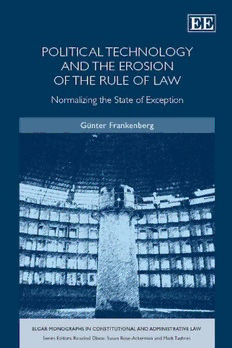
Political Technology And The Erosion Of The Rule Of Law: Normalizing The State Of Exception PDF
Preview Political Technology And The Erosion Of The Rule Of Law: Normalizing The State Of Exception
Political Technology and the Erosion of the Rule of Law Normalizing the State of Exception GiinterFrankenberg ProfessorofPublic Law, LegalPhilosophyandComparative Law, Goethe University, Germany ELGAR MONOGRAPHSIN CONSTITUTIONAL AND ADMINISTRATIVE LAW Edward Elgar Cheltenham,UKeNorthampton,MA,USA JOBNAME:Frankenburg PAGE:4 SESS:6 OUTPUT:ThuDec 514:42:162013 ©SuhrkampVerlagBerlin2014 PublishedinGermanasStaatstechnik:PerspektivenaufRechtsstaatund Ausnahmezustand,Berlin:SuhrkampVerlag ©SuhrkampVerlagBerlin2010 TranslatedbyHarryBauerandGünterFrankenberg AllrightsreservedbyandcontrolledthroughSuhrkampVerlagBerlin. Nopartofthispublicationmaybereproduced,storedinaretrievalsystemor transmittedinanyformorbyanymeans,electronic,mechanicalorphotocopying, recording,orotherwisewithoutthepriorpermissionofthepublisher. Publishedby EdwardElgarPublishingLimited TheLypiatts 15LansdownRoad Cheltenham GlosGL502JA UK EdwardElgarPublishing,Inc. WilliamPrattHouse 9DeweyCourt Northampton Massachusetts01060 USA Acataloguerecordforthisbook isavailablefromtheBritishLibrary LibraryofCongressControlNumber:2013949875 ThisbookisavailableelectronicallyintheElgarOnline.comLawSubject Collection,E-ISBN9781783472529 ISBN9781783472505(cased) TypesetbyColumnsDesignXMLLtd,Reading PrintedandboundinGreatBritainbyT.J.InternationalLtd,Padstow ColumnsDesignXMLLtd / Job:Frankenburg-Political_Technology / Division:00_Prelims /Pg.Position:1/ Date:5/12 JOBNAME:Frankenburg PAGE:5 SESS:3 OUTPUT:ThuDec 514:42:162013 ToEmily,Anya,Jenny,MaxandLucas ColumnsDesignXMLLtd / Job:Frankenburg-Political_Technology / Division:00_Prelims /Pg.Position:2/ Date:24/10 JOBNAME:Frankenburg PAGE:7 SESS:5 OUTPUT:ThuDec 514:42:162013 Contents Preface ix Acknowledgements xiii 1. Acritiqueofpoliticaltechnology 1 1.1 Political technology, good governance and statecraft 1 1.2 Political technology as mindset 5 1.3 Political technology as method 7 1.4 Political technology of the security state 25 2. Visionsofpoliticaltechnology 30 2.1 Hobbes and the beginning of modern political technology 30 2.2 Construction: Images of the Leviathan 34 2.3 Subversion: The Panopticon and the capillaries of power 38 2.4 Deconstruction: From sovereign to democratic aesthetics 42 3. Constellationsoflaw-ruleandthestateofexception 51 3.1 From visual magic to polysemy 51 3.2 Origins, affinities and differences 54 3.3 The Rechtsstaat – a German ‘Sonderweg’ 61 3.4 The constitutionalization of the Rechtsstaat and the state of emergency 71 3.5 The post-Nazi constellation: Locke unplugged, natural law updated 78 3.6 Reinventing the state of exception as ‘protected democracy’ 80 3.7 The form of law-rule versus the substance of the welfare state 83 3.8 Rechtsstaat: All form – no justice? 91 3.9 The preventive state – a global formula 93 4. Thestateofexceptionasmindsetanddoctrine 97 4.1 The ambivalence of the liberal paradigm 97 vii ColumnsDesignXMLLtd / Job:Frankenburg-Political_Technology / Division:00_Prelims /Pg.Position:1/ Date:28/11 JOBNAME:Frankenburg PAGE:8 SESS:5 OUTPUT:ThuDec 514:42:162013 viii Politicaltechnologyandtheerosionof theruleof law 4.2 Apocalypse and the politics of fear: About Schmitt 100 4.3 From Schmitt towards Agamben: The bare state of exception 112 4.4 Search movements: The repressed state of exception 115 4.5 Flirting with the state of exception: Imagining worst-case scenarios 120 4.6 The decapitation of law-rule and Locke 136 4.7 State impotence and abuse as fixed points in the mindset of emergency technicians 139 5. Politicalextremismandthemilitancyoflaw-rule 147 5.1 Protest, law-rule and fear 147 5.2 Hobbes, Locke and the freedom from fear 150 5.3 Preliminary considerations on the analysis of politico-legal fears 152 5.4 The freedom from fear and rationality under law-rule 160 5.5 Manipulations of the legislative techniques of governing 166 5.6 Metalegality and the law of fear 174 5.7 The law of fear and ‘Meta-fundamental Rights’ 179 5.8 Meta-fundamental rights, metalegality and myth 183 6. Normalizingthestateofexception:Counter-terrorismand ‘whateverittakes’ 185 6.1 Terror as manipulative communication 185 6.2 Terrorism and the ‘new security architecture’ 187 6.3 The ‘normalization’of the state of emergency 189 6.4 The logic of militant law 192 6.5 The asymmetry between freedom and security 195 6.6 Militant law as special police law 198 6.7 ‘Enemy criminal law’and other phenomena of militant law 207 6.8 Some effects of combat law and security mentality 216 7. Normalizingtortureasatechniqueofgoverning:What‘the exigenciesofwar’demand? 221 7.1 The domestication of a taboo 221 7.2 A ‘return’to the ‘Middle Ages’? 226 7.3 The new paradigm? 230 7.4 Practical consequences of ‘rescue torture’ 238 7.5 The polysemy of torture and its abuses 245 Bibliography 252 Index 295 ColumnsDesignXMLLtd / Job:Frankenburg-Political_Technology / Division:00_Prelims /Pg.Position:2/ Date:28/11 JOBNAME:Frankenburg PAGE:9 SESS:5 OUTPUT:ThuDec 514:42:162013 Preface One would expect to find neither angels nor paradise in secular societies; rather one would be prepared to encounter conflicts of all kinds. In pluralist societies dispute and dissent are ubiquitous. Rulers have a tendency to dislike conflict and dissent. Therefore, the rule of law is brought in, not to make the ‘powers that be’ like controversy, but to prevent them from arbitrarily intervening in disputes and stifling dissent as well as, incidentally, to keep the passions of civil society at bay. Thereby law-rule – in the guise of the rule of law, Rechtsstaat or état de droit – is widely credited with setting up a regime of distance. In comparison with democracy, republic or human rights, law-rule musters significantly less enthusiasm. ‘Democracy’echoes the desire for participation by promising a government by the people. ‘Republic’stands for accountability and transparency and, arguably, government in the publicinterestandthelightofthepublic.Andhumanrightsaregenerally regarded as the basis of government and are expected to prevent or redress human suffering. In comparison with these rather popular ele- ments of government, law-rule lacks glamour, although it is set up to magically transform personal rule into an impersonal ‘government of laws’and, as a theoretical component of self-government, to ensure that rulers rule in the form of law, observe rights and exercise restraint – not exactly a modest agenda. Law-rule’sdiscretecharmbecomesapparent,though,onceoneturnsto political regimes that know no legal constraints and claim extraordinary powers by dint of emergency law under whatever pretext – curbing terrorism and organized crime, defending the stability of the regime against ‘extremist elements’, punishing traitors (preferably from foreign countries), averting dangers or, more generally, providing security. This book is about security. More to the point: how it happened that torture turned out to be security’s companion and how the state of exception revealed itself as the twin brother of law-rule – not in distant, barbaric regions of the world but in our backyard, in consolidated democracies and rule-of-law countries, like the United States, England and Germany, where power is claimed and widely believed to be civilized; at least: constrained by law. Throughout the last decade state ix ColumnsDesignXMLLtd / Job:Frankenburg-Political_Technology / Division:00_Prelims /Pg.Position:1/ Date:28/11
